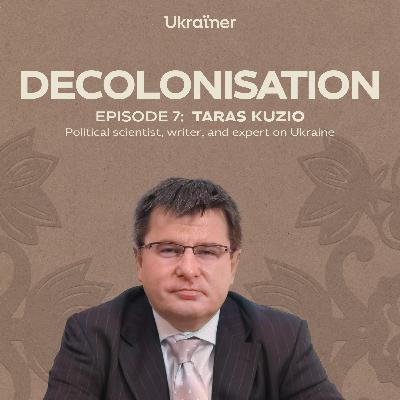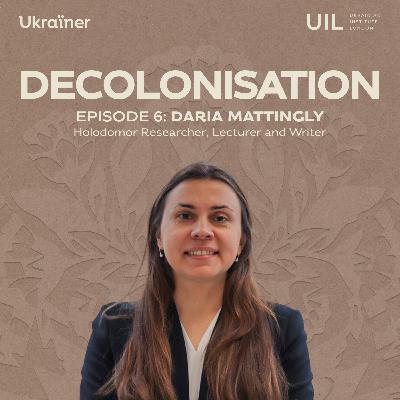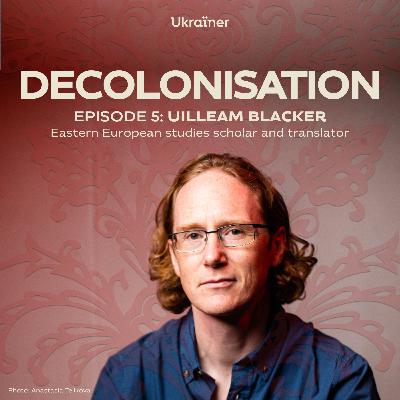Discover Decolonisation
Decolonisation

Decolonisation
Author: Ukraїner International
Subscribed: 3Played: 13Subscribe
Share
© Ukraїner International
Description
In our podcast series, Decolonisation, where we will explore how the fogged perceptions of Ukraine can be improved through decolonisation practices and why the global decolonisation of Ukraine is crucial for a better understanding of Europe’s origins and future.
8 Episodes
Reverse
The guest of the seventh episode of Decolonisation is Taras Kuzio, a renowned British-Canadian political scientist, analyst, and expert on Ukraine. In this episode, Dr Kuzio joins Anastasiia Marushevska, editor-in-chief of Ukraїner International and co-founder of PR Army, to discuss the challenges of decolonising perceptions of Ukraine in Western academia, particularly in light of the dominance of Russianists in post-Soviet studies.
Dr Kuzio explores why Ukraine remained a blind spot in international academia until the full-scale invasion, why the traditional concept of the “post-Soviet” space is outdated, and how academic biases continue to influence Western policy-making on Ukraine.Ukraїner International is a non-profit media that works globally to promote democratic values. If you like the podcast, please support us: https://buymeacoffee.com/ukrainerinternational 📗 Or buy our merchandise and books, where 30% of the cost goes to support our work: https://store.ukrainer.net/en/ Follow us on social media:https://www.youtube.com/@UkrainerinEnglish Instagram: https://www.instagram.com/ukrainer_en FB: https://www.facebook.com/ukrainer.eng
X: https://x.com/ukrainer_en
The guest of the sixth episode of Decolonisation is Daria Mattingly, an Affiliated Lecturer at the University of Cambridge and a lecturer in European History at the University of Chichester. As an expert on the social and cultural history of the USSR, with a particular focus on the 1932–33 Holodomor in Ukraine, Daria has also contributed to Anne Applebaum’s Red Famine. In this episode, Dr Mattingly and Anastasiia Marushevska, editor-in-chief at Ukraїner International and co-founder of PR Army, discuss the role of the Holodomor within the broader context of Russian colonialism.
In this episode, Dr Mattingly explains why all famines in the 20th century were man-made, how the Holodomor stripped Ukrainians of their heirlooms, and what signs point to its genocidal nature.
Ukraїner International is a non-profit media that works globally to promote democratic values. If you like the podcast, please support us: https://buymeacoffee.com/ukrainerinternational 📗 Or buy our merchandise and books, where 30% of the cost goes to support our work: https://store.ukrainer.net/en/ Follow us on social media:https://www.youtube.com/@UkrainerinEnglish Instagram: https://www.instagram.com/ukrainer_en FB: https://www.facebook.com/ukrainer.eng
X: https://x.com/ukrainer_en
The guest of the fifth episode of the Decolonisation series is Dr Uilleam Blacker, a scholar of Ukrainian and East European culture and one of the prominent translators of Ukrainian literature into English. In this episode, Dr Blacker and Anastasiia Marushevska, editor-in-chief of Ukraїner International and co-founder of PR Army, explore how the multi-layered colonial influence has been reflected in Ukrainian literature throughout history.
In this episode, Dr Blacker explores the dual identities of Ukrainian authors under Russian imperial and Soviet rule, contrasts the colonial themes in the works of Mykola Hohol (known as Nikolai Gogol) and Franz Kafka, and discusses how differing cultural peripheries uniquely shaped Ukrainian writers’ anti-colonial perspectives.
Ukraїner International is a non-profit media that works globally to promote democratic values. If you like the podcast, please support us: https://buymeacoffee.com/ukrainerinternational
📗 Or buy our merchandise and books, where 30% of the cost goes to support our work: https://store.ukrainer.net/en/ Follow us on social media:https://www.youtube.com/@UkrainerinEnglish Instagram: https://www.instagram.com/ukrainer_en FB: https://www.facebook.com/ukrainer.eng
X: https://x.com/ukrainer_en
The guest of the fourth episode of the Decolonisation series is Timothy Garton Ash, a renowned British historian, author, and commentator celebrated for his in-depth analysis of modern European history, particularly concerning Central and Eastern Europe. In this episode, Timothy Garton Ash and Anastasiia Marushevska, editor-in-chief at Ukraїner International and co-founder of PR Army, discuss the shift in Europe’s identity as it is perceived in Western academia and by the general public.In this episode, Prof. Ash explains how his latest book, Homelands: A Personal History of Europe, offers an inclusive model of European history, explores the concept of intra-European orientalism, and highlights what distinguishes the decolonisation of Ukraine’s perceptions from those of other nations in the region.Ukraїner International is a non-profit media that works globally to promote democratic values. If you like the podcast, please support us: https://buymeacoffee.com/ukrainerinternational 📗 Or buy our merchandise and books, where 30% of the cost goes to support our work: https://store.ukrainer.net/en/ Follow us on social media:https://www.youtube.com/@UkrainerinEnglish Instagram: https://www.instagram.com/ukrainer_en FB: https://www.facebook.com/ukrainer.eng X: https://x.com/ukrainer_en
The guest of the third episode of the Decolonisation series is Bernard-Henri Lévy, a prominent French philosopher and public intellectual, also known as BHL. In his long career, he has reported on the world’s most impactful wars, including those in Bosnia, Afghanistan, Iraq, and Ukraine. These experiences were reflected in his numerous books, such as The Empire and the Five Kings and Israel Alone. In this episode, Bernard Lévy and Anastasiia Marushevska, editor-in-chief at Ukraїner International and co-founder of PR Army, discuss how decolonisation is related to the ongoing struggle between democratic and authoritarian regimes.
This episode uncovers how the war in Afghanistan set the stage for the Russian invasion of Ukraine, why Ukraine and Israel are coming under fire from far-left populists, and how Russia, Turkey, China, and Iran are shaping a new global anti-democratic axis.
Ukraїner International is a non-profit media that works globally to promote democratic values. If you like the podcast, please support us: https://buymeacoffee.com/ukrainerinternational
📗 Or buy our merchandise and books, where 30% of the cost goes to support our work: https://store.ukrainer.net/en/ Follow us on social media:https://www.youtube.com/@UkrainerinEnglish Instagram: https://www.instagram.com/ukrainer_en FB: https://www.facebook.com/ukrainer.eng
X: https://x.com/ukrainer_en
The guest of the second episode of the Decolonisation series is Jade McGlynn, a leading British expert on Russia, memory politics, history and identity construction. She is a researcher in the War Studies department at King’s College London and the author of “Russia’s War” and “Memory Makers: The Politics of the Past in Putin's Russia”. In this episode, Jade and Anastasiia Marushevska, editor-in-chief at Ukraїner International and co-founder of PR Army, explore how Russia weaponises memory politics and what role Russian historical myths play in its ongoing invasion of Ukraine.
This episode delves into why Vladimir Putin’s historical distortions echo Soviet methods, how this rhetoric is exploited to justify the war crimes committed in Ukraine, and why Milan Kundera’s thesis about the kidnapped West remains unresolved. Anastasiia and Jade also examine how the Russian colonial narratives have come to dominate Western academia, unravel the myth of the great Russian culture, and discuss why Russia’s decolonisation is unattainable without further decolonising Europe.
Ukraїner International is a non-profit media that works globally to promote democratic values. If you like the podcast, please support us: https://buymeacoffee.com/ukrainerinternational
📗 Or buy our merchandise and books, where 30% of the cost goes to support our work: https://store.ukrainer.net/en/ Follow us on social media:https://www.youtube.com/@UkrainerinEnglish Instagram: https://www.instagram.com/ukrainer_en FB: https://www.facebook.com/ukrainer.eng
X: https://x.com/ukrainer_en
The guest of the first episode of the Decolonisation series is Catherine Fieschi, a political scientist and one of the world’s leading experts on populism. She is also the author of the bestselling book “Populocracy: The Tyranny of Authenticity and the Rise of Populism”. In this episode, Catherine and Anastasiia Marushevska, editor-in-chief at Ukraїner International and co-founder of PR Army, focus on populism in Europe, examining both the left and right sides of the political spectrum.This episode explores French populists Jean-Marie Le Pen, Marine Le Pen, and Jean-Luc Mélenchon, and why their rhetoric echoes that of the Soviet Union, as well as how antisemitism plays a role in their political agendas. Anastasiia and Catherine also discuss whether populism can be considered an ideology, how it exploits post-colonial sentiments, and why Ukraine’s resistance to Russian aggression has become a focal point in populist narratives around the world.Ukraїner International is a non-profit media that works globally to promote democratic values. If you like the podcast, please support us: https://buymeacoffee.com/ukrainerinternational 📗 Or buy our merchandise and books, where 30% of the cost goes to support our work: https://store.ukrainer.net/en/ Follow us on social media:https://www.youtube.com/@UkrainerinEnglish Instagram: https://www.instagram.com/ukrainer_en FB: https://www.facebook.com/ukrainer.eng X: https://x.com/ukrainer_en
We invite you to join our new podcast series, Decolonisation, where we will explore how the fogged perceptions of Ukraine can be improved through decolonisation practices and why the global decolonisation of Ukraine is crucial for a better understanding of Europe’s origins and future.
This isn’t merely about Ukrainians, a nation unheard of until 1991; it involves the shared history of Eastern Europe and Ukraine as co-founders of the values now identified as democratic.












